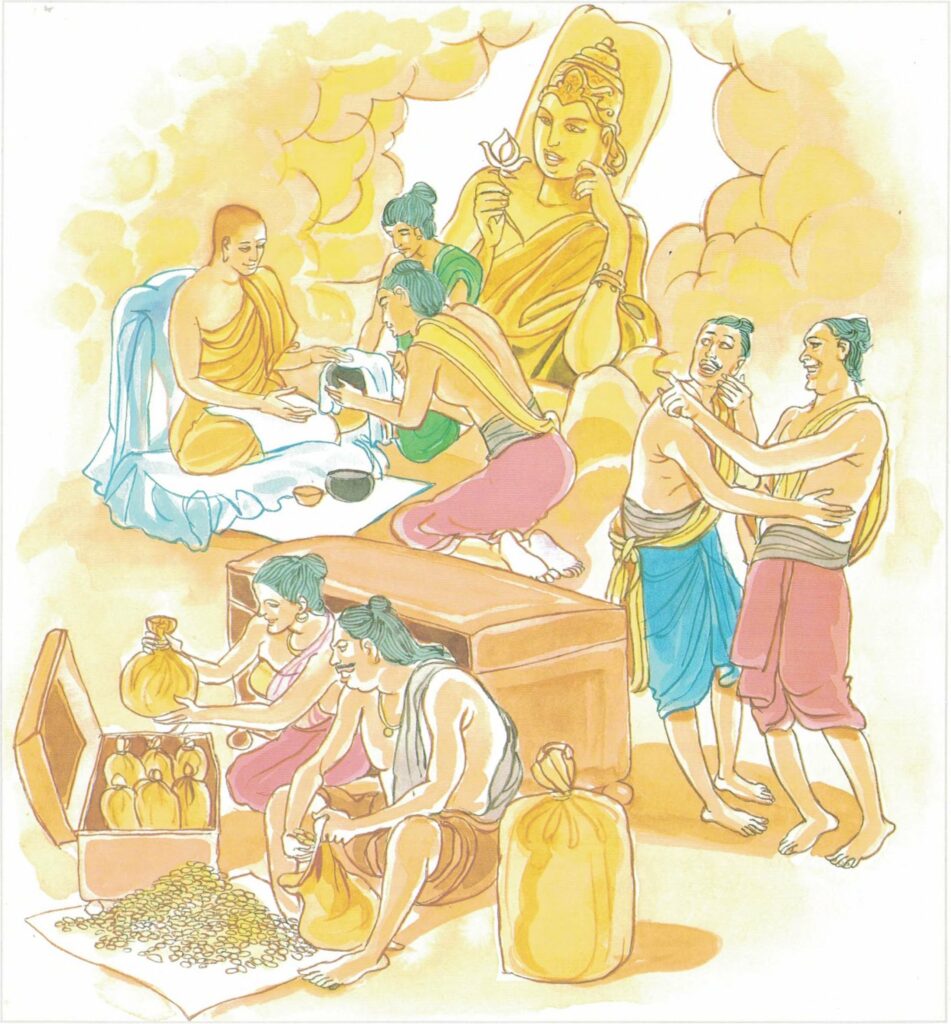Pali text, illustration and English translation of Dhammapada verse 177:
na ve kadariyā devalokaṃ vajanti bālā have nappasaṃsanti dānaṃ |
dhīro ca dānaṃ anumodamāno ten’eva so hoti sūkhī parattha || 177 ||
177. To heavenly realms the mean don’t fare, fools magnanimity ne’er acclaim but the one of wisdom rejoices at giving and happy will be in future lives.

The Story of Cincāmānavikā
While residing at the Jetavana Monastery, the Buddha spoke this verse, with reference to the unrivalled alms-giving of King Pasenadi of Kosala.
Once, the king offered alms to the Buddha and other monks on a grand scale. His subjects, in competition with him, organized another alms-giving ceremony on a grander scale than that of the king. Thus, the king and his subjects kept on competing in giving alms. Finally, Queen Mallikā thought of a plan: to implement this plan, she asked the king to have a grand pavilion built. Next, she asked for five hundred white umbrellas and five hundred tame elephants: those five hundred elephants were to hold the five hundred white umbrellas over the five hundred monks. In the middle of the pavilion, they kept ten boats which were filled with perfumes and incense. There were also two hundred and fifty princesses, who kept fanning the five hundred monks. Since the subjects of the king had no princesses, nor white umbrellas, nor elephants, they could no longer compete with the king. When all preparations were made, alms-food was offered. After the meal, the king made an offering of all the things in the pavilion, which were worth fourteen billion.
At the time, two ministers of the king were present. Of those two, the minister named Junha was very pleased and praised the king for having offered alms so generously to the Buddha and his Monks. He also reflected that such offerings could only be made by a king. He was very glad because the king would share the merit of his good deeds with all beings. In short, the minister Junha rejoiced with the king in his unrivalled charity. The minister Kāla, on the other hand, thought that the king was only squandering, by giving away fourteen billion in a single day, and that the monks would just go back to the monastery and sleep. After the meal, the Buddha looked over at the audience and knew how Kāla the minister was feeling. Then, he thought that if he were to deliver a lengthy discourse of appreciation, Kāla would get more dissatisfied, and in consequence would have to suffer more in his next existence.
On seeing the king, the Buddha said, “Great King! You should rejoice that you have succeeded in making the offering of the unrivalled charity (asadisadāna). Such an opportunity comes very rarely: it comes only once during the appearance of each Buddha. But your minister Kāla had felt it was a waste, and was not at all appreciative. So, if I had given a lengthy discourse, he would get more and more dissatisfied and uncomfortable, and in consequence, he would suffer much more in the present existence as well as in the next. That was why I preached so briefly. Then the Buddha added, “Great King! Fools do not rejoice in the charities given by others and go to the lower worlds. The wise rejoice in other people’s charities, and through appreciation, they share in the merit gained by others and go to the abode of the devas.”
Explanatory Translation (Verse 177)
kadariyā ve devālokaṃ na vajanti, bālā have dānaṃ nappasaṃsanti
dhīro ca dānaṃ anumodamāno so tena eva parattha sukhī hoti
kadariyā: the extreme misers; ve: certainly; devālokaṃ [devāloka]: world of gods; na vajanti: do not reach; bālā: the ignorant ones; have: certainly; dānaṃ [dāna]: charity; nappasaṃsanti: do not praise; dhīro ca: as for the wise noble one; dānaṃ [dāna]: the act of charity; anumodamāno [anumodamāna]: rejoicing over; so: he (therefore); tena eva: through that approval itself;parattha: in the next birth; sukhī: an enjoyer of happiness; hoti: becomes
The extreme misers do not reach the heavenly worlds. The evil, ignorant ones do not approve acts of charity. But those wise noble ones approve and partake of charity. In consequence, they are happy in the next birth.
Commentary and exegetical material (Verse 177)
dāna: act of charity: generosity. Dāna is the first perfection (pārami). It confers upon the giver the double blessing of inhibiting immoral thoughts of selfishness, while developing pure thoughts of selflessness. “It blesseth him that gives and him that takes.” A Bodhisatta is not concerned as to whether the recipient is truly in need or not, for his one object in practicing generosity, as he does, is to eliminate craving that lies dormant within himself. The joy of service, its attendant happiness, and the alleviation of suffering are other blessings of generosity.
Related Articles: